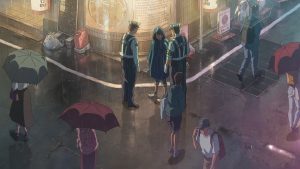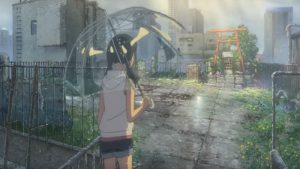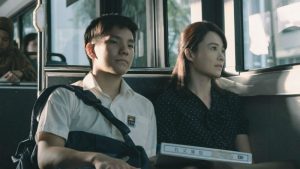QUICK SNAP: LIVE FROM TALLINN
Self-contained fable Birth Of The Oases (Marion Jamault, France, 9 mins) is a near-perfect portrayal of a symbiotic relationship. The cold-blooded hilltop snake struggles to keep warm while the two-humped camel is constantly exhausted by the desert’s heat. They come to a mutually helpful agreement whereby the cold snake takes up residence on the camel’s humps. This warms up the snake and cools down the camel. After the camel dies from old age, the snake moves around the sand dunes – here designed to look like a never ending series of camels humps – to create first water and later full blown oases which, according to the armadillo revealed as the narrator at the very end, to this very day.
In the black and white classroom of the black and white world of The Boy And The Elephant (Sonia Gerbeaud, France, 7 mins), black and white kids taunt someone who is different – a boy with an elephant head who is coloured blue. One kid, though, takes an interest – a boy who is coloured red, and the two embark on a playground friendship which could be read as a gay relationship, a state threatened by the red boy’s need to conform and revert to fit in with the black and whites. Eventually, a black and white girl takes pity on the elephant head, accepts him and he is subsumed into the group.
Marea (Guilia Martinelli, Switzerland, 5 mins) is another self-contained fable about a family living on an island within an hermetically sealed dome.
Stop-frame marvel Laika & Nemo (Jan Gaderman/Sebastian Gadow, Germany, 15 mins), arguably my favourite film in the programme, again concerns an outsider – a boy who lives in a lighthouse who is regularly tormented by fellow pupils and local fishermen at the harbour for wearing deep sea diving gear. When an astronaut crashes his spaceship near the lighthouse, the two helmet-wearers bond which puts them in a good place for when one of those local fishermen drops a key into the harbour.
Last but not least, The Queen Of The Foxes (Marina Rosset, Switzerland, 9 mins) is a French tale about the saddest member of a group of foxes who is, perhaps for that reason, made their queen. The other foxes’ inability to write hampers their attempts at writing such a letter to cheer her up. Instead, they steal from the nearby town all the love letters people have never been brave enough to send, delivering one which results in the uniting of a happy human couple who write their own letter to the fox queen thanking her for their efforts, which finally does the trick. The foxes then deliver the other letters, and the town windows suddenly become full of lively couples, straight, gay, even a threesome.
Which goes to show that programmes of kids animation can be a lot dirtier than you might expect.
The third of three programmes of Kids Animation shorts plays in the Tallinn Black Nights Film Festival.












